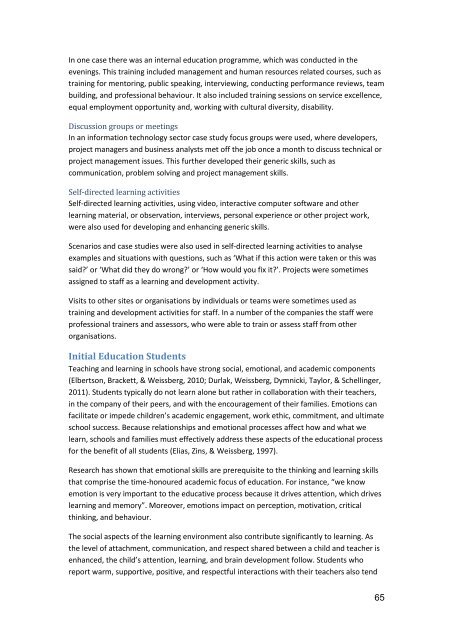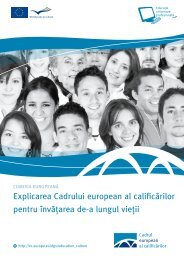Teaching and Assessing Soft Skills - MASS - Measuring and ...
Teaching and Assessing Soft Skills - MASS - Measuring and ...
Teaching and Assessing Soft Skills - MASS - Measuring and ...
You also want an ePaper? Increase the reach of your titles
YUMPU automatically turns print PDFs into web optimized ePapers that Google loves.
In one case there was an internal education programme, which was conducted in the<br />
evenings. This training included management <strong>and</strong> human resources related courses, such as<br />
training for mentoring, public speaking, interviewing, conducting performance reviews, team<br />
building, <strong>and</strong> professional behaviour. It also included training sessions on service excellence,<br />
equal employment opportunity <strong>and</strong>, working with cultural diversity, disability.<br />
Discussion groups or meetings<br />
In an information technology sector case study focus groups were used, where developers,<br />
project managers <strong>and</strong> business analysts met off the job once a month to discuss technical or<br />
project management issues. This further developed their generic skills, such as<br />
communication, problem solving <strong>and</strong> project management skills.<br />
Self-directed learning activities<br />
Self-directed learning activities, using video, interactive computer software <strong>and</strong> other<br />
learning material, or observation, interviews, personal experience or other project work,<br />
were also used for developing <strong>and</strong> enhancing generic skills.<br />
Scenarios <strong>and</strong> case studies were also used in self-directed learning activities to analyse<br />
examples <strong>and</strong> situations with questions, such as ‘What if this action were taken or this was<br />
said?’ or ‘What did they do wrong?’ or ‘How would you fix it?’. Projects were sometimes<br />
assigned to staff as a learning <strong>and</strong> development activity.<br />
Visits to other sites or organisations by individuals or teams were sometimes used as<br />
training <strong>and</strong> development activities for staff. In a number of the companies the staff were<br />
professional trainers <strong>and</strong> assessors, who were able to train or assess staff from other<br />
organisations.<br />
Initial Education Students<br />
<strong>Teaching</strong> <strong>and</strong> learning in schools have strong social, emotional, <strong>and</strong> academic components<br />
(Elbertson, Brackett, & Weissberg, 2010; Durlak, Weissberg, Dymnicki, Taylor, & Schellinger,<br />
2011). Students typically do not learn alone but rather in collaboration with their teachers,<br />
in the company of their peers, <strong>and</strong> with the encouragement of their families. Emotions can<br />
facilitate or impede children’s academic engagement, work ethic, commitment, <strong>and</strong> ultimate<br />
school success. Because relationships <strong>and</strong> emotional processes affect how <strong>and</strong> what we<br />
learn, schools <strong>and</strong> families must effectively address these aspects of the educational process<br />
for the benefit of all students (Elias, Zins, & Weissberg, 1997).<br />
Research has shown that emotional skills are prerequisite to the thinking <strong>and</strong> learning skills<br />
that comprise the time-honoured academic focus of education. For instance, “we know<br />
emotion is very important to the educative process because it drives attention, which drives<br />
learning <strong>and</strong> memory”. Moreover, emotions impact on perception, motivation, critical<br />
thinking, <strong>and</strong> behaviour.<br />
The social aspects of the learning environment also contribute significantly to learning. As<br />
the level of attachment, communication, <strong>and</strong> respect shared between a child <strong>and</strong> teacher is<br />
enhanced, the child’s attention, learning, <strong>and</strong> brain development follow. Students who<br />
report warm, supportive, positive, <strong>and</strong> respectful interactions with their teachers also tend<br />
65





